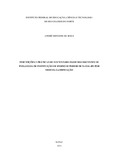Percepções e práticas de sustentabilidade dos docentes de pedagogia de instituição de ensino superior de Natal-RN por meio da gamificação

Visualizar/
Data
2021-09-09Autor
Jesus, André Menezes de
http://lattes.cnpq.br/7604414682445605
Metadado
Mostrar registro completoResumo
Since the inception of the 2030 Agenda, higher education institutions have begun to expand
their social and environmental commitments and responsibilities, including 17 Sustainable
Development Goals (SDGs), especially for SDG 4 of the agenda, to provide quality education.
Recently, in the landscape of scientific literature, there has been an increase in research
calling for more active teaching methods over the great hegemonic traditional teaching
methods in higher education. In the field of education, debates and reflections are becoming
more frequent, emphasizing the need to implement differentiated teaching methods in order to
find better strategies to meet the emerging social and professional environment. The aim of
this study was to investigate perceptions and sustainability practices of teachers of the
Pedagogy course of a private institution of higher education located in Natal-RN, aiming at
the implementation of gamification in teaching-learning. Employing principles of a qualitative
research with a case study design, applied and theoretically based; it also followed procedures
of documentary and curricular analysis with the Pedagogy course and survey of primary data
from the application of an online questionnaire to 15 teachers of the course, which was
submitted to data and content analysis. The results showed the inexistence of awareness in
relation to the subject and lack of didactic materials, sustainability actions in the educational
field, as well as the absence of continuing education courses on sustainability mediated from
active methodologies that allow intellectual independence and the overcoming of a hidden
curriculum of unsustainability in the formation of professionals. However, it can also be
considered a certain comfortableness on the part of teachers in relation to waiting for some
training from the educational institution, for not seeking ways to eliminate these adversities in
their classroom routines. In summary, the study enabled the construction of a continuing
education course for teachers through the insertion of gamification-based learning, aiming to
support the training and construction of social-ecological knowledge in the face of socialecological crises through gamified elements in order to perform meaningful and innovative
learning, training socially critical professionals facing a dynamic learning in teacher training.
Seeking to transform its activities into living teaching and learning practices, motivating
students and making them creative and protagonists.



